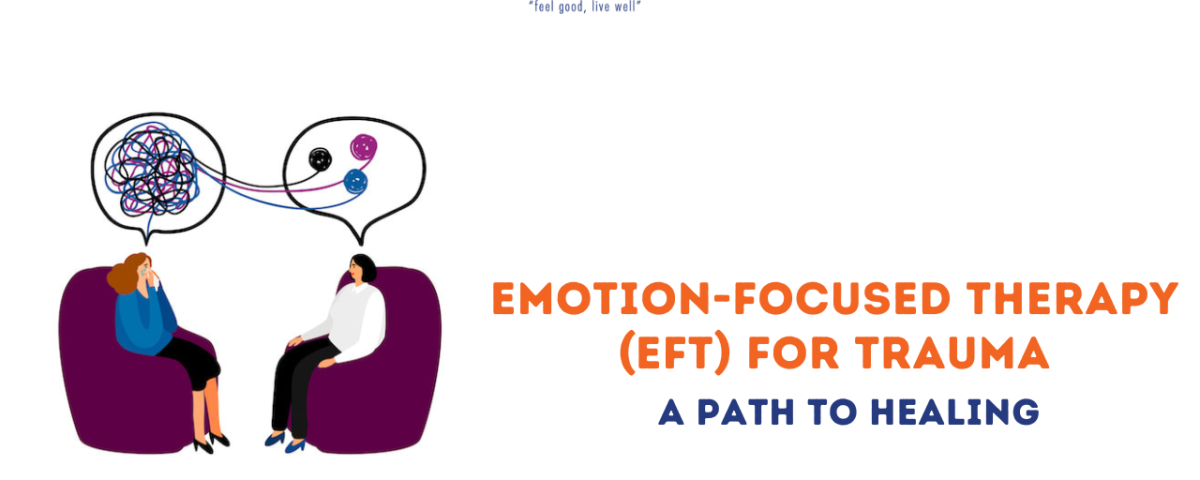Emotion-Focused Therapy (EFT) for Trauma: A Path to Healing
Emotion-Focused Therapy (EFT) is a therapeutic approach grounded in the principles of humanistic and process-experiential psychology. It offers a unique perspective on treating trauma by focusing on emotions as the key to understanding and changing distressing experiences. Developed by Leslie Greenberg and colleagues, EFTT integrates the profound insights of Sandra Paivio and Greenberg’s own principles of trauma therapy to provide a holistic and effective treatment. This blog post explores the fundamentals and goals of EFT for trauma, aiming to provide valuable insights for individuals considering therapy.
Understanding Trauma
Trauma can deeply affect an individual’s emotional, psychological, and physical well-being. It often leaves one feeling stuck, with intense emotions such as fear, anger, sadness, or even numbness. Traditional therapies have primarily focused on cognitive and behavioural interventions. However, EFT for trauma emphasises the importance of engaging with and processing emotional experiences as a central pathway to healing.
The Fundamentals of EFT for Trauma
EFT for trauma is based on several key principles and practices:
- Emotion as a Guide: Emotions are seen as fundamental to identity and a key source of information about what is important to us. EFT helps individuals learn to better identify, experience, understand, and regulate emotions.
- Creating a Safe Therapeutic Space: A foundational aspect of EFT is establishing a secure, empathetic therapeutic relationship where clients feel safe to explore and express their emotions.
- Processing Emotional Experiences: The therapy focuses on helping clients change their emotional experiences by making sense of their feelings and learning to approach, rather than avoid, emotional pain.
- Transforming Emotions: A critical goal of EFT is to help clients transform maladaptive emotions (e.g., shame, fear) into adaptive ones (e.g., compassion, empowerment) by accessing primary adaptive emotions that have been blocked by the trauma.
Goals of EFT for Trauma
The overarching goal of EFT for trauma is emotional healing and growth. This involves several specific objectives:
- Developing Emotional Awareness: Helping clients become more aware of their emotional responses and learning to articulate the feelings associated with their traumatic experiences.
- Regulating Emotions: Teaching client’s strategies for managing overwhelming emotions to reduce symptoms of distress.
- Transforming Maladaptive Emotions: Facilitating the process of transforming stuck, painful emotions into healthier ones that promote healing.
- Reconstructing Meaning: Assisting clients in making sense of their trauma and integrating the experience into their life story in a way that fosters resilience and growth.
- Promoting Relational Healing: Since trauma often affects relationships, EFT also focuses on healing interpersonal aspects by improving emotional communication and fostering secure connections with others.
EFT for trauma provides a compassionate and effective approach to healing.
By focusing on the role of emotion in trauma and utilising the therapeutic relationship as a safe space for emotional exploration, EFT aims to facilitate deep and lasting change. For those considering therapy, understanding the principles and goals of EFT can be a helpful step in the journey toward recovery. Remember, the path to healing is deeply personal, and engaging with one’s emotions through EFT can offer a transformative experience, leading to emotional freedom and a renewed sense of self.
CBT Professionals are qualified and knowledgeable psychologists that can help you with this. Our Principal Director and Clinical psychologist, Karen Gallaty, has significant experience in utilising emotion-focused therapy to foster both day-to-day functioning and long-term healing.
She is experienced and passionate about helping individuals along their journey with an effective and compassionate approach to your healing.
Reach out today!
Coomera – (07) 5551 0251
Nerang – (07) 5668 3490
Mount Gravatt – (07) 3102 1366
If you, or someone you know, require help, please reach out to organisations like Beyond Blue.
Additionally, reach out to these organisations that may be able to help.
- ReachOut (youth mental health service) — online help
- SANE Australia — call 1800 187 263
- Mental Illness Fellowship of Australia (MIFA) — call 1800 985 944
- LifeLine 13 11 14 — for anyone in crisis
THREE CONVENIENT LOCATIONS
MOUNT GRAVATT
Mt Gravatt Medical PrecinctSE 105, 1808 Logan Rd
Upper Mount Gravatt QLD 4122


